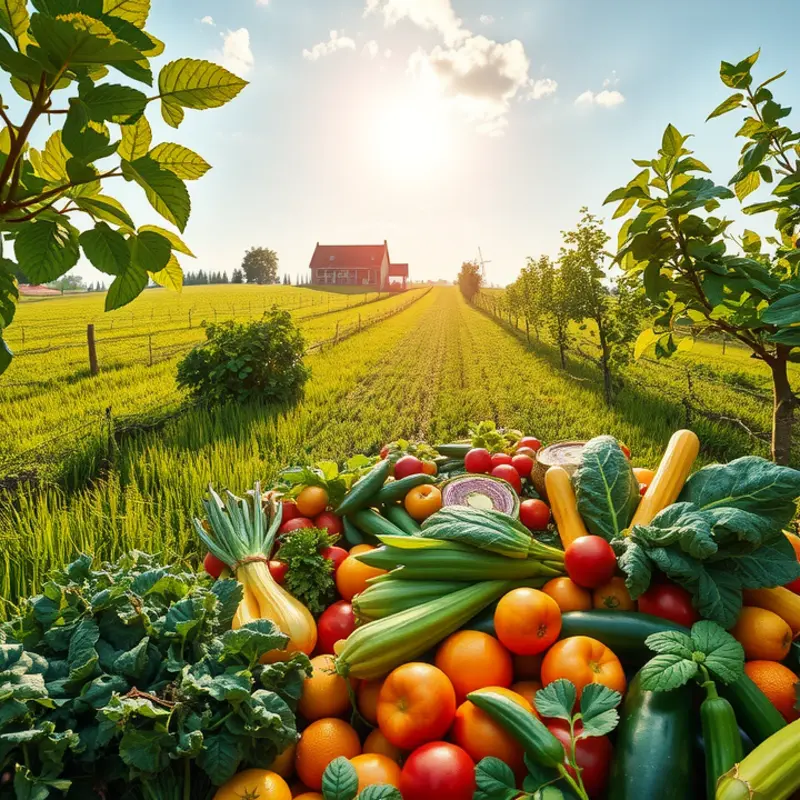Making eco-friendly food choices is an impactful way to contribute to a healthier planet. By reducing our dietary footprint, we can minimize environmental degradation and promote sustainability. This guide offers practical, ethical strategies for environment-conscious individuals seeking to adjust their diets for the better. From plant-based innovations to mindful consumption, every choice counts towards nurturing our Earth. Let’s explore these solutions together.
Embracing Plant-Based Eating

Transitioning towards a plant-based diet is a powerful way to reduce your dietary footprint. This shift not only supports environmental sustainability but also enhances personal health. A diet rich in plants can significantly lower greenhouse gas emissions. Livestock farming accounts for a large percentage of global emissions, while plant cultivation has a much smaller carbon footprint.
Water conservation is another critical benefit. Producing plant-based foods generally requires less water compared to meat production. For example, the water usage for growing grains or vegetables is far less than the vast quantities needed for livestock, which involves not only hydration but also maintaining their living conditions.
Preserving biodiversity is another compelling reason to embrace plant-based eating. Monoculture practices, often linked to animal feed production, can reduce biodiversity. In contrast, diverse plant cultivation promotes varied ecosystems that support numerous species.
Making the transition to plant-based eating can be manageable with a few strategic approaches. First, exploring local markets for seasonal produce can be a rewarding experience. Seasonal fruits and vegetables are often fresher and more affordable, reducing the carbon footprint associated with transporting out-of-season produce over long distances.
Experimenting with meat alternatives can also ease this transition. Plant-based proteins like legumes, tofu, and tempeh offer versatile options that satisfy both taste and nutritional needs. Swapping meat for these alternatives in your favorite recipes can gradually adjust your palate.
Understanding the nutritional benefits of a plant-based diet is crucial. A balanced plant-based diet provides essential nutrients, fiber, and antioxidants, which contribute to overall health. It’s important to ensure you get enough protein, iron, and vitamin B12, which are commonly found in animal products. Consulting with a nutrition expert or utilizing resources like the nutritional adequacy basics guide can be helpful.
Real-life examples of successful transitions can inspire your journey. Consider adopting ‘Meatless Mondays,’ which can make the shift feel less overwhelming. Joining a community group or participating in cooking classes focused on plant-based meals can provide support and new ideas.
Embracing plant-based eating is a pivotal step towards a greener, more sustainable future. Each plant-based meal contributes to a collective effort to minimize environmental harm while enhancing personal well-being, creating a win-win situation for you and the planet.
Sourcing Responsibly: Local and Seasonal Choices

Choosing foods that are locally grown and in season is an impactful way to support sustainable agriculture and reduce your dietary footprint. By opting for local produce, you directly contribute to lowering transportation emissions, as these foods do not need to travel long distances to reach your plate. This reduction in transportation needs leads to a decrease in fossil fuel use, thus lessening your carbon footprint.
Supporting local agriculture also injects money directly into your community, enhancing local economies. Farmers’ markets are perfect venues to explore local foods. They serve as hubs, connecting consumers to growers, ensuring that the produce is fresh and minimally processed. To find a farmers’ market near you, check online community boards or local event listings that frequently update market schedules and locations.
Another excellent option is joining a community-supported agriculture (CSA) program. CSAs offer a pre-paid subscription to seasonal produce collected directly from local farms. This model not only guarantees you a steady supply of fresh produce but also provides farmers with upfront capital, reducing the financial risks associated with farming.
Exploring seasonal recipe ideas is a fun way to align your cooking with the natural rhythms of nature. In-season produce ensures peak freshness and flavor, often at a lower cost due to its abundance. Websites and cookbooks dedicated to seasonal cooking can serve as an inspiration, allowing you to adapt your diet to what’s locally available.
Reading food labels effectively can be daunting, but it’s crucial for making informed decisions. Beyond the basics, pay attention to terms like organic, non-GMO, and sustainably sourced. Organic labels signify that no synthetic fertilizers or pesticides were used, and genetically modified organisms (GMOs) are avoided. Non-GMO labels go a step further in affirming the absence of genetic modifications. Similarly, sustainably sourced labels indicate that the product was grown without harming the environment.
When grocery shopping, prioritize these attributes. While organic and non-GMO foods can be more cost-intensive, they have a reduced impact on biodiversity and soil health. Making use of meal prep techniques, like minimal prep dinner ideas, can help strike a balance between convenience and environmental consideration.
It’s also important to understand that sustainable eating isn’t about perfection; it’s about making better choices wherever possible. Whether you grow your own herbs or participate in a CSA, each step contributes to nurturing a healthier planet. By embracing local and seasonal foods, you’re not just making a dietary choice; you’re supporting a future where farming practices promote life in all its diversity.
Final words
Adjusting our diets to be more sustainable is within reach for everyone. By embracing plant-based options and sourcing food responsibly, we can collectively reduce our dietary footprint. These choices not only benefit the planet but also create healthier lifestyles for ourselves and future generations. Remember, every meal presents an opportunity for positive change. As you embark on this journey, know that even the smallest adjustments make a significant impact. Let’s commit to nourishing our bodies while caring for our Earth, one delicious bite at a time.








